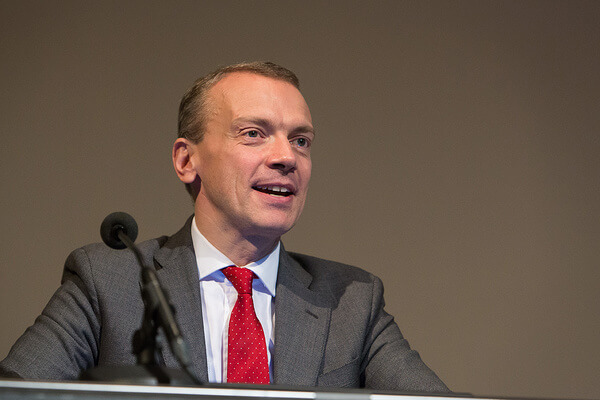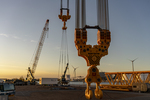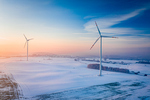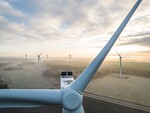News Release from windfair.net
Wind Industry Profile of
Onshore Giant Up in the North
Water and nuclear power in particular still account for the largest share of Sweden's energy mix at present - despite the fact that the decision to phase out nuclear power was already taken at the end of the 1970s. After this decision had been reversed in the meantime and the performance of the remaining three nuclear power plants had been continuously increased, Sweden's state-owned energy company Vattenfall took the matter seriously in 2015 and finally decided to phase out - at least for the time being. At the same time, the government announced that it intended to entirely phase out all fossil fuels in all consumption sectors, i.e. electricity, heat and transport. By 2040, the Swedes want to obtain their entire energy supply from renewable sources.
To this end, onshore wind energy in particular is now being massively expanded. The planned Markbyden wind farm, which will combine a cluster of smaller wind farms into an onshore giant with an output of up to 4 gigawatts in three phases, is part of this.
The Swedish project developer Svewind has been working on the project for more than 15 years and the first phase of it, Markbyden ETT (= One), has now been started. Europe's largest onshore wind farm with 650 megawatts is being built on site.
Wolfgang Kropp, CEO of Svevind, commented: "Having worked on the development of the Markbygden cluster of wind farm projects since 2002, Svevind is very excited to see this partnership with GE Renewables, GE Energy Financial Services and the Green Investment Group come to fruition." German company 4initia GmbH and Fieldstone completed the sale of the project to the partners at the beginning of November. A European banking consortium, including the HSH Nordbank, is contributing to the financing.
The project in northern Sweden is a logistical challenge. Although there are hardly any residents who could delay the construction of the cluster due to protest actions, the site is also located far away from the big cities with their logistics hubs. Next largest town is Piteå, with a population of almost 20,000.

Subarctic climate: Winters are long and cold. (Image: Svewind)
In addition, the climate is harsh and the winters are long. GE Renewable Energy will supply 179 of their 3.6 MW turbines with 137 meter rotors, a turbine ideally suited for the project site's wind speeds and climate. The turbine blades will be equipped with an innovative ice mitigation system by LM Wind Power, ensuring a stable level of availability and reduced downtime. In addition, GE will be responsible for maintenance for the next 20 years.
Meanwhile, construction work has begun on the huge wind field. For this purpose, a separate gravel and a concrete plant was built, and 130 km of internal wind farm paths are being built on site, as reported by 4initia. This should make it possible to have up to 1,101 wind turbines installed once the entire cluster has been completed. Markbyden ETT alone increases the share of wind energy in Sweden's electricity mix by 12.5 percent.
The partners have already found a buyer for their electricity: Norsk Hydro, one of the world's largest aluminium producers, has signed a power purchase agreement (PPA) to supply its aluminium smelters in Norway with energy. This is the largest contract of its kind in the world to date.
Giles Dickson, CEO of WindEurope, the European wind energy association, recently expressed his support for this type of contract:
“These latest PPA deals are a significant vote of confidence in the PPA model. PPAs all started with the ICT sector sourcing renewables for their data centres. Now energy-intensive manufacturing sectors such as aluminium are buying wind. European industry has signed 2.6 GW of PPA deals in wind energy over the past four years, 1.3 GW of which were in 2017 alone. PPAs provide clean, reliable and competitive power for the corporate off-taker. What these deals also show is that countries like Sweden, the Netherlands and Norway that position themselves as ‘PPA-friendly’ are increasingly attracting major industrial investments on the back of that. We hope major countries like Germany, France, Italy and Spain, will take note and change regulations in a way that will allow corporates to procure more green electricity.”

Giles Dickson calls for more courage from European companies to get involved in PPAs. (Picture: WindEurope)
Wind energy has meanwhile established itself as the cheapest form of the new electricity generation. It is therefore not surprising that the recently published IEA ( International Energy Agency) World Energy Outlook shows that wind is well on the way to becoming Europe's leading power source shortly after 2030. In order to achieve this, however, individual national governments must ensure a legal framework in the long term, in particular through ambitious national energy and climate action plans that provide clarity on volumes and auctions after 2020.
- Author:
- Katrin Radtke
- Email:
- press@windfair.net
- Keywords:
- GE Renewables, Svewind, Sweden, cluster, onshore, MW, GW, WindEruope, Giles Dickson, PPA
















